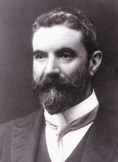 |
Member for Ballaarat (Victoria) 1901-1913 |
|
Alfred Deakin was born in Collingwood, Victoria, graduated in law from the University of Melbourne, and was admitted to the Bar in 1877. He wrote articles for the Melbourne Age, and in 1880 edited the Melbourne weekly, The Leader. He entered Victorian politics as the member of the Legislative Assembly for West Bourke in 1879, and was soon recognised as a progressive liberal politician, devoted to the causes of protectionism and colonial nationalism.
Deakin was the youngest delegate to the 1891 National Australasian Convention and was elected to the Australasian Federal Convention of 1897-98. As a member of the Constitutional Committee at both conventions, he was influential in promoting democratic and liberal principles in the Constitution, and played an important role in mediating and negotiating among the delegates. He was a leader in the referendum campaigns for the Constitution Bill throughout Australia, and was the Victorian delegate to London to see the Constitution Bill through the British Parliament. Deakin’s support of Edmund Barton in December 1900 was instrumental in Barton being invited by the Governor-General to form the first Commonwealth ministry. Deakin was appointed to the Ministry as the first federal Attorney-General.
In March 1901 Deakin was elected to represent the federal seat of Ballaarat as a Protectionist in the first House of Representatives. A stalwart supporter of Barton in the first Parliament, he took over leadership of the government on Barton’s retirement from politics in 1903 and served as Prime Minister 1903-04, 1905-08 and 1909-10, leading governments which were responsible for the establishment of major national institutions and policies.
Deakin retired from politics in 1913 owing to ill health. He served on a number of commissions during 1913-14, but from 1916 lived his life as a recluse.
previous | list of members | next
|


